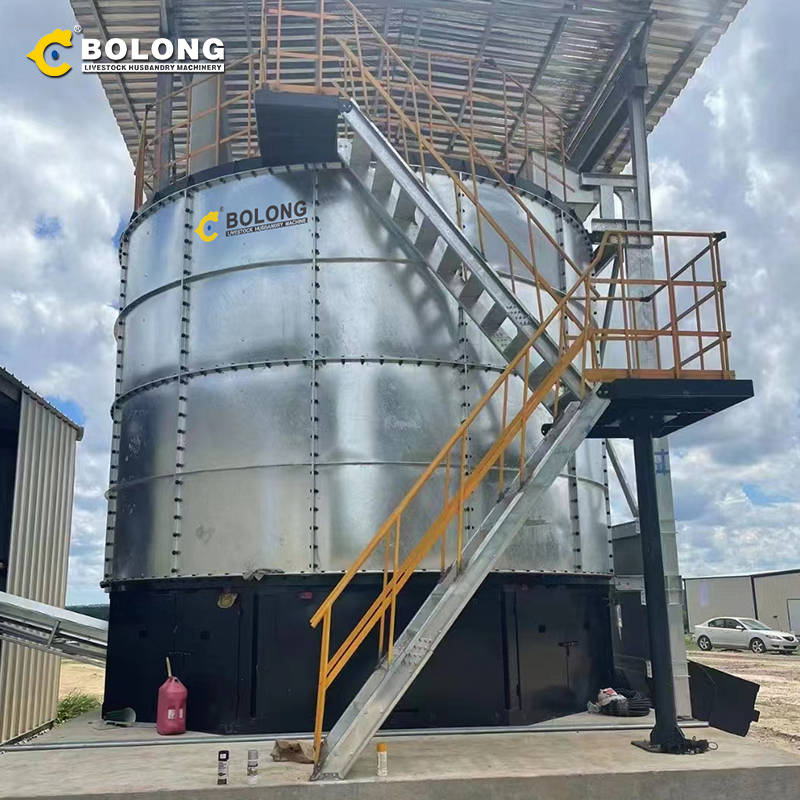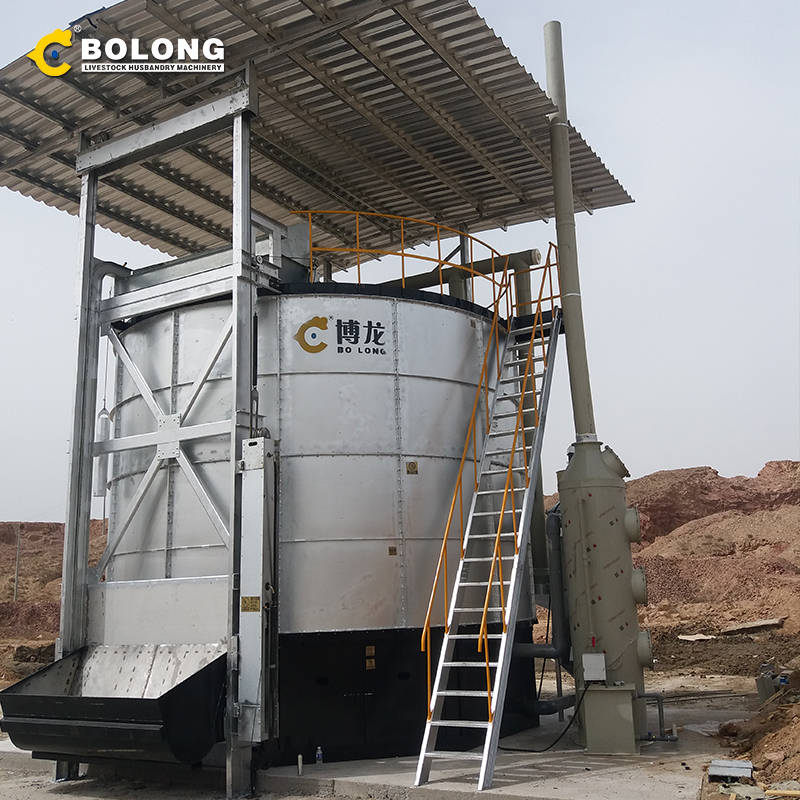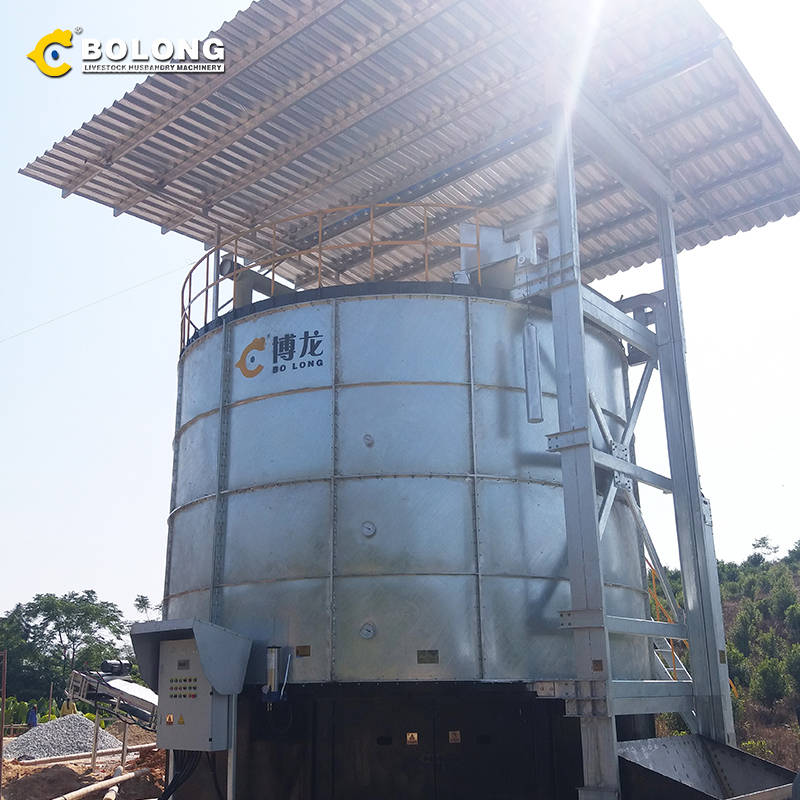Organic fertilizer plays an important role in agricultural production, not only to improve soil structure, but also to promote the healthy growth of crops. However, the traditional method of compost fermentation often takes months to complete due to the limitations of natural conditions, which is not only inefficient, but also has the problems of odor diffusion and germs residue. Modern composting machine technology is becoming the core equipment for organic fertilizer production by virtue of its intelligent and efficient features. In this paper, we will discuss in detail how the composting machine can accelerate the fermentation process of organic fertilizer.
Composting machine is a kind of equipment designed for rapid fermentation of organic materials, which can provide the best environment suitable for rapid decomposition of organic matter by microorganisms through adjusting the environmental conditions. It mainly realizes accelerated fermentation through the following core principles:
① Provide controlled temperature, humidity and oxygen environment;
② Introducing efficient microbial strains;
③ Uniform treatment of the material using stirring or turning devices.
Under these optimized conditions, the composting machine can significantly increase the decomposition rate of organic matter and shorten the fermentation cycle.

Temperature is a key factor affecting the fermentation speed. Traditional compost is limited by the external environment, it is difficult to maintain the temperature in the optimal range, while the composting machine is equipped with a temperature control system can accurately adjust the fermentation temperature. The appropriate temperature (generally 50-65°C) can activate the activity of microorganisms and accelerate the decomposition of organic matter. In addition, during the high temperature stage, the composting machine can effectively kill pathogens, parasites and weed seeds, thus improving the safety and quality of organic fertilizer.
Oxygen-demanding microorganisms are the main driving force of organic matter decomposition, and their activity depends on sufficient oxygen supply. Conventional composting is often poorly ventilated due to dense piles, resulting in an anaerobic environment that slows down fermentation and produces a bad odor. In contrast, the composting machine is equipped with a ventilator that can automatically supply oxygen according to the demand of the material, ensuring that the oxygen concentration is maintained in a reasonable range (generally 15-18%). This process not only improves the decomposition efficiency of microorganisms, but also reduces methane and hydrogen sulfide emissions caused by anaerobic fermentation.
Composting machines are usually equipped with a stirring device inside the composting machine, which allows the mixture to be mixed on a regular basis. This homogenization process prevents problems such as locally high temperatures, insufficient oxygen or uneven humidity. Through regular stirring, the composting machine can ensure that microorganisms work efficiently throughout the fermentation process, further enhancing the decomposition rate of organic matter.
Humidity has an important impact on the growth and metabolism of microorganisms. Conventional composting tends to be too wet during the rainy season and too dry during drought, which limits the fermentation process. The built-in humidity control system in the composting machine can monitor the humidity of the material in real time and maintain the humidity in the optimal range of 50-60% through automatic spraying or drainage. Suitable humidity conditions can greatly enhance the activity of microorganisms and promote the rapid maturation of organic fertilizer.
In the composting machine, specific high-efficiency bacterial strains, such as actinomycetes, yeasts and lactic acid bacteria, can be inoculated artificially. These strains have a strong decomposition ability and can rapidly degrade cellulose, lignin and other difficult-to-decompose organic components, thus significantly accelerating the fermentation process. In addition, the addition of strains can inhibit the growth of harmful bacteria and optimize the fermentation effect.
Composting machines are usually equipped with an automated control system that can monitor and regulate the temperature, humidity, oxygen concentration and other key parameters in the fermentation process in real time. Through the collaborative work of sensors and control systems, the composting machine can precisely adjust the environmental conditions according to the needs of the fermentation stage, realizing the unmanned management of the whole process. This intelligent management not only improves fermentation efficiency, but also significantly reduces labor costs.

Compared with traditional composting, the composting machine shows obvious advantages in several aspects:
Traditional compost takes months to complete, while the composting machine usually only 7-15 days, significantly improving production efficiency.
Through precise control of temperature and humidity, the composting machine can effectively kill pathogens and weed seeds to produce safer and more efficient organic fertilizer.
The sealed environment and scientific management of the composting machine can significantly reduce the odor and harmful gas emission and improve the production environment.
Traditional composting requires a large area of landfill, while the composting machine has a compact structure and covers a small area, which is suitable for large-scale production.

Composting machine technology has been widely used in some large-scale organic fertilizer plants. For example, a large-scale farm will be livestock and poultry manure as raw materials, through the fermentation tank fermentation treatment, only 10 days to produce high-quality organic fertilizer. At the same time, by utilizing the automation system of the composting machine, the plant has significantly reduced the input of manual operation and saved nearly 40% of the operation cost.
In addition, composting machines are also widely used in municipal food waste treatment projects. After food waste is processed by the composting machine, it can not only be quickly converted into organic fertilizer, but also realize resource utilization and reduce the environmental problems caused by landfills.
The composting machine effectively accelerates the fermentation process of organic fertilizer through temperature control, oxygen supply, stirring, humidity regulation, microbial inoculation and intelligent management and other technical means. This modern equipment not only significantly shortens the fermentation time and improves the quality of fertilizer, but also reduces environmental pollution and promotes the development of agricultural circular economy. With the continuous progress of science and technology, fermentation tank technology in the production of organic fertilizer will be more widely used, to achieve sustainable agriculture to provide strong support.